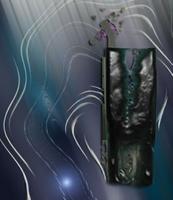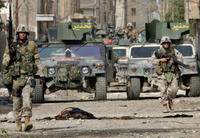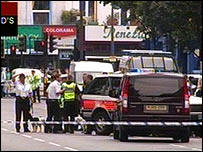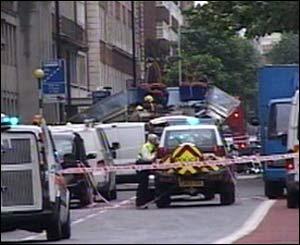It is part and parcel of the modern world that travel, communication, and rumour move with ever increasing speed. People and ideas are more mobile than at any time in history whilst religious and cultural divides often remain determinedly entrenched and immobile. In such a world as ours, the idea of war as an event that occurs between sovereign states with defined frontlines and geographically limited war zones has become outdated. It is no longer possible for a country to conduct military expeditions abroad, enforce its will on another state or group by killing the necessary number of individuals and then to return home, safe in the knowledge that all that bad stuff happened over there - out of sight - and eventually out of mind.
These days, as we have seen, there is a latent price to pay. For the British people the
de facto frontline of any modern war starts somewhere between Oxford Circus and Tottenham Court Road. Temporal limits are also ill defined. Just because the UN security council passes a resolution to say that there is a new Iraqi government and the occupation is over doesn't make it so. Just because our government has refused to
count the casualties of war won't make them disappear from memory - either in the hearts of their families or the minds of those who would exploit the anger and hatred for their strategic purpose. Just because we choose to ignore the
600 civilians who were killed in the American bombing of Falluja in April 2004 doesn't mean the rest of the world will conveniently do the same. Just because the civilian toll in the much greater devastation of Falluja in November 2004 is currently unknown doesn't mean it no longer happened.
I remember a conversation with a friend, from the town in rural England where I grew up, on the eve of the November assault. Falluja is where all the terrorists are he asserted, bombing it is the right thing to do. What could be said - partial ignorance of the facts - no understanding of the probable outcomes - no where to go... make mine a guiness.
Globilised worlds, globilised wars, no hiding place for peoples of the imperial powers anymore.
In 1920 it was all so different of course. Then Britain was occupying Iraq and faced with a resistance movement. Our strategy that time round was an interesting mirror image of that adopted in the current war. Eighty years ago we chose to back the Sunnis, disempowering the Shia majority, and setting in train the resentment that exists today. In 2003/4 we decided to go with the Shia, promoting a wholesale discrimination against the Sunnis in the allocation of power and position. Al Sistani said thanks very much and in return for the power handover promised by early elections halted the Shia uprisings and ended the siege of Najaf in 2004. Fragmentation of the country has of course resulted and the near civil-war state that exist was officially stamped with democratic approval by the holding of elections when the Sunnis were guaranteed not to vote.
Why would the UK and US want this disfunctional and conflict state to be created? By mid 2004 it was clear they could not win the war against a resistance movement of a united Iraq, and with public opinion progressively hardening against the occupation forces (see surveys published by
Oxford Research International) they were forced to revisit the history books. Faced with inevitable defeat they adopted the tried and tested formula of colonial powers throught the ages. Divide and Rule! They are still losing of course, as any brief visit to the
Brookings Institute or the
Iraq coalition Casualty Count will indicate. The elections and the construction of the government were, of course, counter-productive to peace and security and there was a linear increase in average US fatalities between March and June 2005 peaking at about 23 deaths and 150 total casualties per week (higher than the same time last year). The dips before and after this period seem to correlate most closely with rumours of negociation between the US/Iraqi government and elements of the nationalist resistance movement. The Americans will learn - you just have to give them time, a lot of it....
So where does this all leave the victims of the terrible and indefensible attacks on London? Pawns in the grand game, an inevitable and unavoidable price for ensuring energy and economic security for the US and UK? Victims of our failed political system which allows Blair, Straw, and others of their ilk to not just survive, but return renewed to political power? Victims of religious ideology that can be twisted to justify bringing hell to earth? People like you or I, just in the wrong place at the wrong time.
I would like to leave the last words to
someone who has been living with terror so much longer than we have. The British Prime Minister says he wants to understand radicalisation. This would be a good place to start.
 The UK government has been using the current security crisis, ironically produced by its own policies, as a means to bring in new, and many would say, draconian legislation.
The UK government has been using the current security crisis, ironically produced by its own policies, as a means to bring in new, and many would say, draconian legislation.
















